Do Pigeons Eat Wasps? Benefits and Risks
We know pigeons mainly feed on seeds and grains. However, we sometimes see this bird consuming insects as well.
One insect that pigeons commonly fly around is the wasp. But do pigeons eat wasps? Yes, pigeons eat wasps. However, they do not feed on this insect as part of their primary diet. Pigeons consume this insect mainly when they find it difficult to manage their primary diet food. Insects like wasps can fill the need for protein to an extent.
Now, this is just a brief answer. Although pigeons occasionally eat wasps, they actually receive healthy benefits from it. If you want to know more in detail, move on to the main part now!
Looking for more articles about pigeon food:
Why Do Pigeons Eat Wasps?
We may see pigeons eating wasps. However, they occasionally eat wasps as this is not a regular or primary part of their diet.
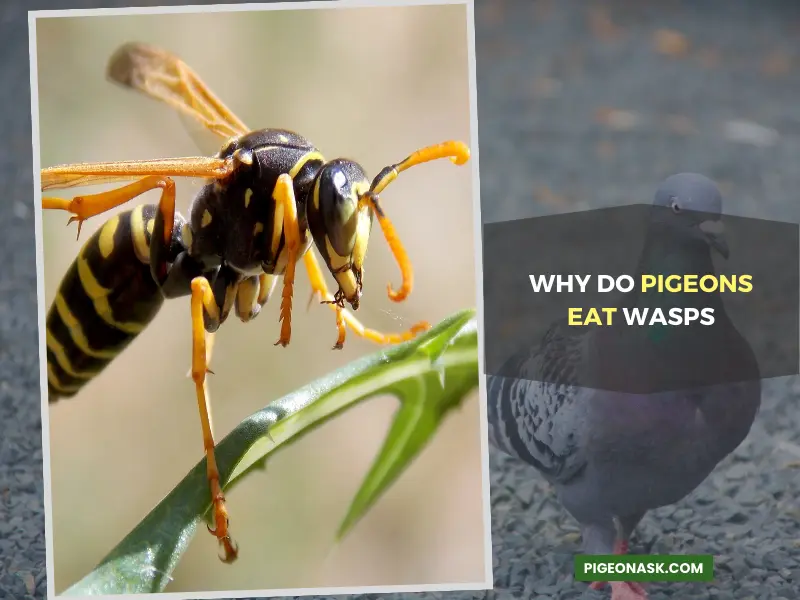
Pigeons are primarily seed and grain eaters, with some plant matter included in their diet. However, there are instances where pigeons might consume wasps. So, here is why pigeons eat wasps.
01. Accidental Ingestion
Pigeons might ingest small insects like wasps and bees accidentally. They can do it by foraging for seeds, grains, and other food sources, but not with this intention.
02. Protein Source
Insects can provide a source of protein, which is essential for birds’ growth and overall health. Pigeons consume wasps when other food sources are scarce or to supplement their protein intake.
03. Feeding Behavior
Pigeons are opportunistic feeders and might explore different food items. They do it especially when they encounter them, including insects like wasps.
These birds basically explore and try out many things by consuming. Any types of flies, like wasps are preferred by them.
They in fact, start eating this insect more when they find health benefits. Note that they also find it fun to catch flies like this.
04. Parental Behavior
During the breeding season, pigeons might increase their protein intake. This provides adequate nutrition to their chicks. Insects like wasps could be consumed and regurgitated to feed the chicks.
It’s important to note that while pigeons might occasionally eat insects like wasps. But they do not rely on them as a primary food source.
Pigeons’ dietary requirements are best met through a balanced diet of seeds, grains, and appropriate bird feed.
Are Wasps a Regular Part of a Pigeon’s Diet?
You know pigeons eat wasps. Now, you may wonder, are wasps a regular part of a pigeon’s diet? Well, no! Pigeons do not consider this insect a regular part of their diet.
They feed on this occasionally. To be precise, pigeons eat insects like wasps when they can not find enough of their regular food.
For any type of scarcity in their regular diet food, they go for insects like wasps. However, it is never their choice to rely on wasps in any way as part of their regular diet.
See our in-depth “Pigeon Foods and Diet” article to learn what these urban birds eat. We cover their dietary habits and nutrition.
How Do Pigeons Eat Wasps?
Pigeons can eat insects like wasps without getting hurt. When pigeons encounter insects like wasps, their eating behavior can involve the following steps.
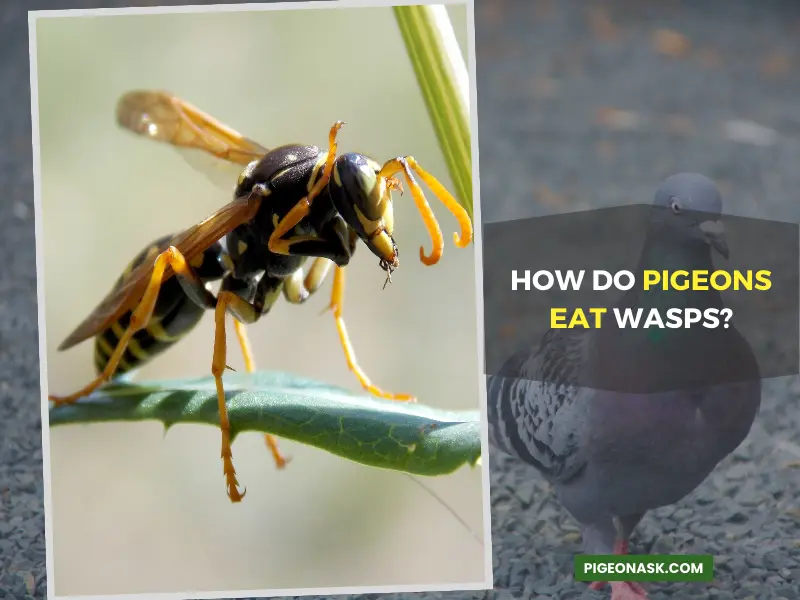
Foraging
Pigeons search for various food sources, including seeds and grains. And they look for insects occasionally as they move around their environment. So, the first thing they do is look for wasps around them.
Capture
When a pigeon sees a wasp flying around, it usually attempts to catch it with its beak. Pigeons have agile and precise beak movements in general. This allows them to capture small moving prey.
Ingestion
After capturing a wasp, the pigeon might swallow it whole. Pigeons do not have teeth. So, they rely on swallowing their food whole.
These birds use their muscular stomach, called the gizzard, to break down food particles.
Digestion
The swallowed insect enters the pigeon’s digestive system. There, it will be broken down and digested.
Pigeons have a unique digestive system that includes the crop, which temporarily stores food. On the other hand, the gizzard helps grind down food.
So, this is how pigeons eat wasps.
Can Pigeons Effectively Catch and Consume Wasps?
You know pigeons do not commonly eat wasps. However, whenever they do, they do it with good skills. That means pigeons can effectively catch and consume wasps.
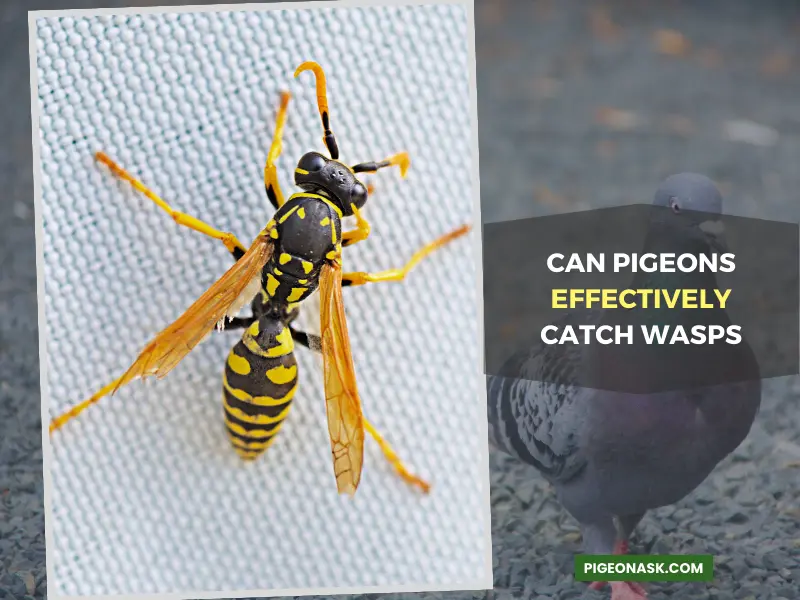
Pigeons can catch small insects, including wasps. They do it especially when they come across them while foraging. Pigeons have agile beaks and can make quick, precise movements. This helps them to capture small moving prey.
However, their ability to catch wasps effectively depends on various factors. This includes the size and agility of the wasp, the pigeon’s hunting experience, and the specific circumstances.
It’s important to note that pigeons are not specialized insect hunters. So, capturing insects like wasps is not a primary or regular part of their diet. Pigeons primarily feed on seeds, grains, and some plant matter.
Are There Any Potential Risks for Pigeons When Eating Wasps?
Pigeons can get nutrients and other benefits from eating wasps. However, there are some potential risks for pigeons when eating wasps. These risks are stated below.
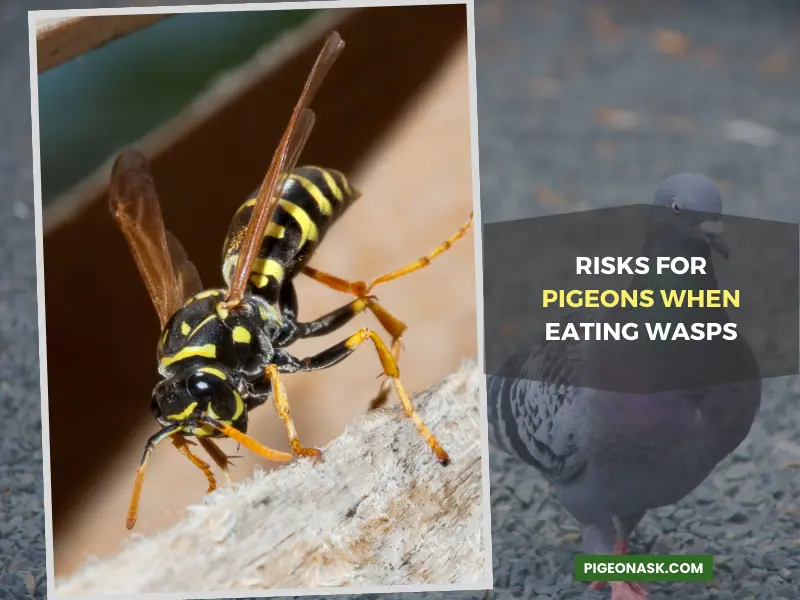
01. Stings
Pigeons may be stung by wasps while attempting to capture or consume them. Wasp stings can be painful and cause localized swelling or discomfort. This can even cause infections if the string is too hard.
02. Allergic Reactions
Just like humans, some pigeons may be allergic to wasp stings. From this insect, an allergic reaction could occur.
This can lead to more severe symptoms. Pigeons can have difficulty breathing or anaphylaxis, which is a life-threatening allergic reaction.
03. Toxicity
Certain wasp species are actually toxic to pigeons. This is because wasps contain a certain level of venom. Ingesting or being stung by toxic wasps could lead to adverse health effects.
04. Digestive Issues
Insects like wasps have exoskeletons that can be challenging to digest. Consuming large quantities of insects might lead to digestive issues for pigeons.
Due to this, pigeons may have an upset stomach and other digestive complications as well.
05. Dietary Imbalance
Pigeons have specific nutritional requirements. Relying too heavily on insects for their diet can lead to imbalances in their nutrient intake.
This means pigeons eating wasps too often can imbalance the nutritional condition over time.
Is There Any Nutritional Value for Pigeons in Consuming Wasps?
Pigeons may occasionally consume wasps or other small insects. The nutritional value they gain from doing so is generally limited.
These birds have specific dietary preferences and requirements, primarily seeds and grains. Insects like wasps can provide some protein. However, they are not a significant or primary source of nutrition for pigeons.
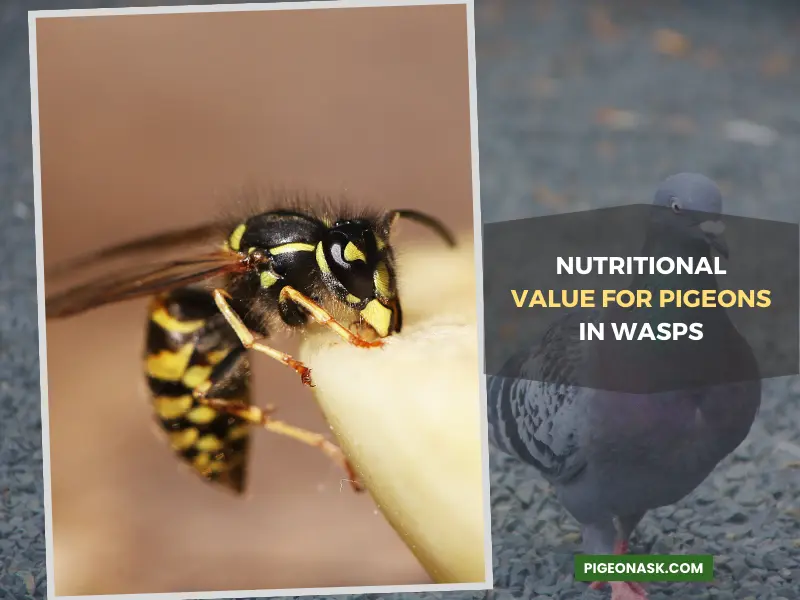
The nutritional value of insects can vary depending on their size and species. In general, insects are relatively high in protein.
Which makes them an easy resource of nutrients for birds. However, pigeons can obtain sufficient protein from their regular diet without relying on insects.
Moreover, wasps have fats, vitamins, and minerals, but the quantity is not that significant. So, pigeons can gain nutritional benefits from eating wasps.
The Final Words
Now you have got the answer to do pigeons eat wasps or not! You must have no more confusion regarding this.
So, that brings us to the end of this article before we wrap up with a bonus tip. If you are petting pigeons and they are young, you should not feed wasps. This is because wasps can upset the stomach of young pigeons and cause trouble.
As we conclude this article, we believe you will stay connected and follow us on Facebook, Twitter, and Pinterest!
Image Credit:
- Canva.com/photos
Reference:
- https://www.researchgate.net/figure/Species-of-birds-and-social-wasps-in-nesting-associations-at-Retiro-Novo-Farm-Pantanal_tbl1_292707664
